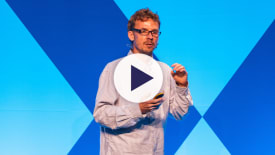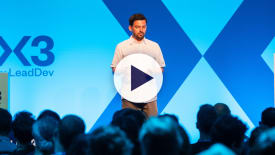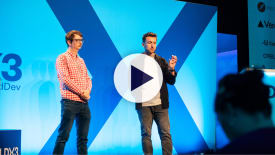
Latest videos
-

Onboarding as a manager: How AI changed my first months
Learn how AI can support new engineering managers by accelerating context gathering, easing overwhelm, and enhancing team understanding.
-

How to lead when you just don’t know the tech
How to lead successfully in unfamiliar technical domains by embracing uncertainty, empowering teams, and still delivering results – even when you’re not the expert.
-

The lean architect: Experimenting your way to better decisions
Discover how hypothesis-driven architecture helps Staff+ engineers make better decisions early, reduce risk, and build resilient systems.
-

Optimization of mobile development strategy for maximum business impact
Learn how to optimize mobile strategy—tech choices, team structure, and processes—for faster delivery, scalability, and measurable business results
-

Theory to action: Architecting and implementing your team operating system
Learn the theory behind the operating systems of high-performing engineering teams. Leave with a practical idea of how to design a flexible team operating system with rhythms, tools, and feedback loops for your team.
-

Tracking repository health at scale
Discover how data-driven repository health tracking improves visibility, drives behavior change, and aligns engineering efforts with long-term business goals.
-

How Monzo tolerates full cloud outages
Learn how Monzo built a fully independent backup bank to ensure 24/7 reliability—even during full cloud outages
Highlights from our conferences

Measure for Change
Picking metrics is one thing. But the harder decisions lie in what to do with them afterward.
View all videos from LeadDev London

Drive product gaps as an engineering leader
Discover practical strategies for engineering leaders to influence product development effectively, even in the absence of strong product management and a clear company vision.
view all videos from LeadDev NEW YORK

Growth in a downturn
In this talk, Smruti Patel asks, if hyper-growth is marked by spending more to make more, what does building for enduring growth look like?
view all videos from LeadDev berlin

Idea to Innovation
Join me as we embark on a journey to dissect the anatomy of innovation, uncover strategies to unlock the full potential of ideas, and transform them into impactful realities. Let’s build a strong culture of innovation, and make sure that it is not just a buzzword but a tangible outcome.
view all videos from staffplus london

Slack enterprise key management: Senior to staff lessons
Explore the key lessons and skills Audrei gained during their first Staff+ project, Slack Enterprise Key Management. This talk offers insights for anyone growing in their Staff+ career.
view all videos from staffplus NEW YORK
All videos
-

Designing effective criteria for assessing engineering candidates equitably
Unlock engineering talent through equitable hiring
-

Recognizing and rectifying your mistakes as an engineering leader
Openly acknowledging and accepting our faults
-

Creating and sustaining motivation in engineering teams
Energizing and uplifting your direct reports
-

Building and conveying vision
Until a certain point in your career you’re likely to be told the strategy for your company. If you need guidance, you’re able to look up to the people above you.
-

Taking risks in production
Being an engineer, we all have at least one common thread: We like to build things. That is why writing code and architecting platforms that scale for millions of customers is appealing.
-

Avoiding “shiny object” syndrome when building software
Technology is fast moving, and devops tools pop up like wildfire. Teams are desperate to solve their problems & often make implementation decisions based on word of mouth, “kick the tires” syndrome or superficial evaluations.
-

Designing effective OKRs
When they work well, OKRs have the potential to be a powerful tool that can clarify vision at all levels of the business, all while providing autonomy for smaller functions to set their own goals and objectives.
-

Finding potential in your interview processes
Hiring engineers is hard. And with over half of C-suite executives saying that the future of their company relies on being able to source engineering talent, making the correct decisions about who to hire has the potential to transform the fortune of your company.
-

Tradeoffs on the road to observability
SRE and infrastructure engineering are about allocating adequate time to do project work that improves the long-term sustainability of our services. But what do we reward SREs for doing? Does your company have a culture of “not invented here” or the converse of “ask the consultants to design it for us”?
-

Avoiding the pitfalls of rebuilding software
If you think back to the work you were doing last year, it probably feels miles away – and that’s great! As engineers, we’re continually building and creating great new stuff – it’s what we do.
-

Investing in your accessibility workflow
There’s no arguing that building accessible websites is a force for good. Everyone, regardless of ability or disability, ought to have the right to participate on the web.
-

Powerful questions and active listening
As leaders in technology, we’re problem-solvers. We’re practiced in having good answers, and we are often promoted based on our ability to provide the “right answers” – solutions to business problems. But what about asking the “right questions”?
-

I’m newly remote under coronavirus, AMA
In this session, we’ve assembled a group of engineering leaders who have had their working life affected by coronavirus. Attendees will have the opportunity to pre-submit questions to the panel to understand how this has changed the way they’re working, how they recommend making the switch, and how to mitigate the tensions that will initially occur.
-

Strategies for Rapidly Pivoting to Remote Work
Over 74% of engineering teams now have team members who work remotely. And while remote work has the potential to bring many benefits, it also has unique points of tension that, if handled incorrectly, can damage the health of your team.
-

Leading Engineering Teams Through Times of Uncertainty
At the core of an engineering managers’ role is the responsibility to ensure the happiness of your teams. As a leader, you’re expected to shield your teams from outside noise and create a stable environment for work – but what happens when there are situations too big for you to resolve?
-

Engineering leadership in the time of coronavirus
As unprecedented situations occur, as a company it is your duty to ensure the safety of your employees. As such, you’ve made the decision to work remotely; you’ve made sure everyone’s safe and that they can connect to your systems. Their Instant Bloomberg (IB) dots are green.
-

On Postponing Lead Dev New York and London
In January, news reports began to emerge of Coronavirus. The news was shocking, upsetting, and evidently very serious. But while we watched the news anxiously, we were still weeks away from understanding just how frightening the chain of events would be, and how they would impact our working lives.
-

Minimum Viable Business Continuity Management
The COVID-19 pandemic has probably made many of us view our Business Continuity Management approach quite differently to how we might have 6 months ago.
-
An intro to Nativescript
Mobile app development has always required learning each platform’s programming language and peculiarities. For developers coming from the web, where you write once and run anywhere, this is tough.
-
Practical web security
Computer security talks are too often filled with theoretical computer scientists telling us about how the end is nigh. Don’t get me wrong, I love knowing the nitty details of cryptographic algorithms, but a whole lot of web developers don’t.
-
Building replicable dev environments with Docker
Maintaining different software environments to run multiple web projects is a time-consuming task. Have you ever returned to an old project, only to find that you have to reinstall older versions of software before even starting any work?
-
An intro to Rush
A very brief introduction to Rust and why it should be on your radar. Rust is a “systems” programming language that is designed to be a modern replacement for C++. It has an impressive out-of-the box tool chain, an interesting approach to safe concurrency and easy integration with C and other languages. It’s certainly a powerful tool to have at your disposal.

